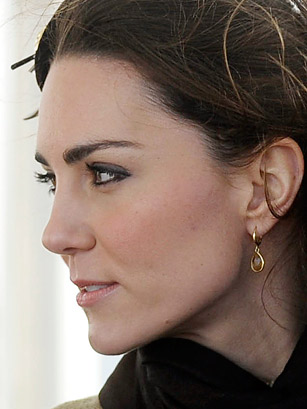
(3 of 3)
Doubtless, the Middleton family business — an online supplier of party goods called Party Pieces — has gained exposure from its founders' newfound prominence. Pippa has reportedly secured a substantial advance for a book about holding the perfect party. But that hardly puts the family in Billy Carter territory. Rosie Boycott, who founded a feminist magazine and edited three of Britain's national newspapers, notes the sharp contrast between the solidity of the Middletons and the dysfunction of Diana's aristocratic childhood. Diana, whose mother fled the marital home and lost custody of her children to their emotionally distant father, went on to marry a man who loved someone else: she was a tragedy waiting to happen.
Kate, nurtured and well educated, comes to palace life with a supportive husband and an expectation that family is not a battleground but a refuge. "Kate has become a global phenomenon and a popular figure, but not in the way with Diana you held your breath — what's going to happen? — the sense you were watching someone on the precipice," says Boycott.
Diana's narrative of fragility made for great copy. Eventually, she came to use the press as the press used her. But before she learned to manipulate her coverage, she signaled her distress by developing an eating disorder. The more she was on show, the less there was to see. It would hardly be surprising if Kate, one of the most photographed women in the world, is feeling the pressure. Since she was first identified as William's girlfriend in 2004, lenses have been trained on her, documenting a transition not unusual for women in their 20s, from sleek to slim. That transition has triggered disapproval. "The Duchess of Cambridge has now become a 'role model' on controversial pro-anorexia websites because of her continued weight loss," sniped the Mail on Sunday in August.
There are important questions about the malign influence of too many too-thin celebrities vaunted as ideals of femininity. And it's easy to understand how such celebrities, forced to see themselves through the basilisk eye of the paparazzi, might continue the vicious cycle by shedding weight to fit the scrawny ideal, only to find themselves attacked for meeting it. For the record, Kate looks healthy in the flesh, though there's not much flesh: she's willowy and close to 6 ft. in heels.
Behind the scenes, officials are exasperated about the focus on her weight, just as they bridled at the earlier focus on her wait. Kate appears unruffled. That lack of drama might eventually make us lose interest in the star attraction of the Windsor circus, a tightrope walker who doesn't wobble. For the moment, her poise is central to her appeal. Perfectly composed, she seems far removed from everyday celebrityland and its public meltdowns.
Game of Phones
There's another reason Kate enjoys a better chance of living happily ever after. The spring wedding was followed by a summer of scandal that tarnished politicians, police and, most of all, the British press. An earlier discovery that mobile phones belonging to Princes William and Harry were hacked by and on behalf of Rupert Murdoch's News of the World led to the jailing of a journalist and a private eye in 2007. This year, the scandal came back to life, shuttering the paper in July. Evidence is emerging that the royals and other public figures have for decades been spied on by the U.K. press. This has been an acknowledged dark side of the world's obsession with the English royals since at least 1997, when Earl Spencer, in his funeral oration for his sister, reflected a widespread sentiment that a hungry media shared the blame for that car crash in the Pont de l'Alma tunnel.
"Kate is incredibly lucky that the hacking scandal came out," says Boycott. "There's more rigor about what the press can and can't do. There's absolutely a sense of the desperation Diana was driven to. They won't push Kate to the same extent."
This restraint doesn't extend overseas or online, and Kate has already been pronounced pregnant more than once. In September, the U.S. tabloid the Star declared, "Kate pregnant with twins! — a boy and a girl." The October 2011 Commonwealth Heads of Government Meeting agreed to change the rules of succession that have hitherto favored male children over female. Kate is set to be the first royal to give birth in an equal-opportunity household. It's not exactly a big win for feminism, but it does eliminate what otherwise might have been Kate's next wait: for a male heir.
A contented princess, with a private life that remains more or less private, seems unlikely to shake the Establishment or lend it fresh heft. As a role model, Kate may prove no Diana. But that's not necessarily a bad thing, for Kate or for the young women tempted to emulate her. Reinvesting celebrity with restraint, preserving silence in a confessional age, making a marriage work, making a royal marriage work — these would be the actions of a true revolutionary.